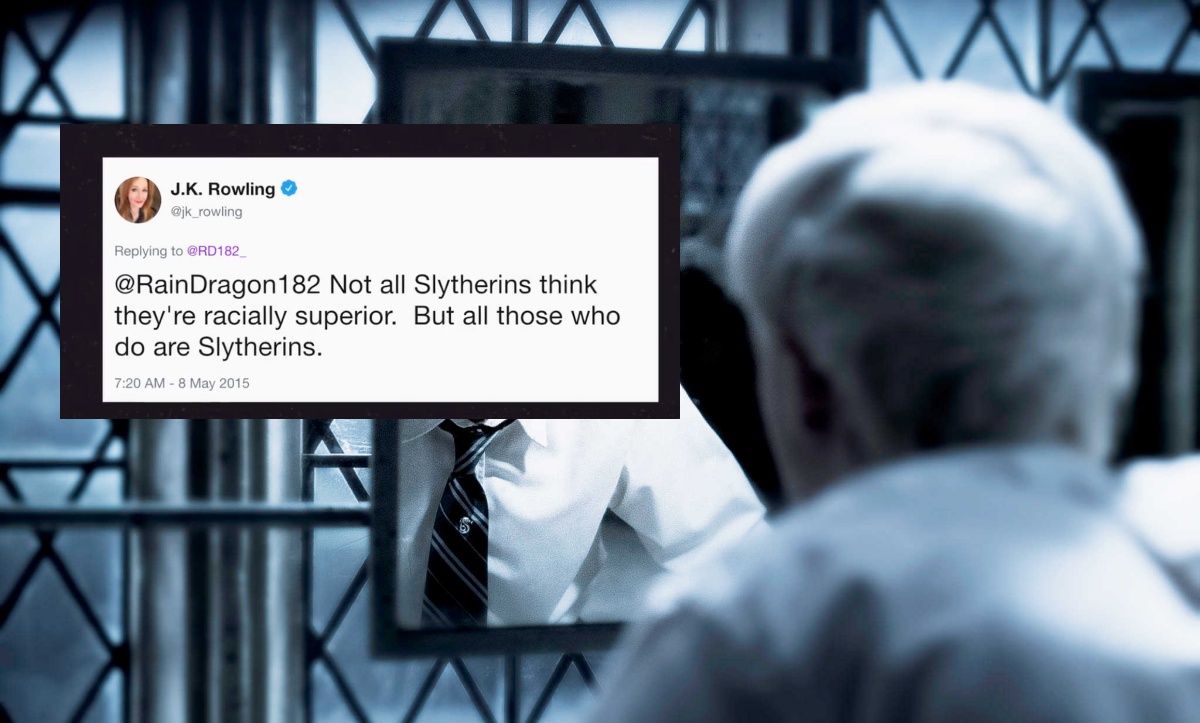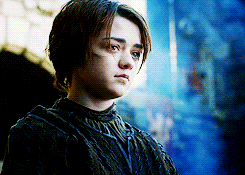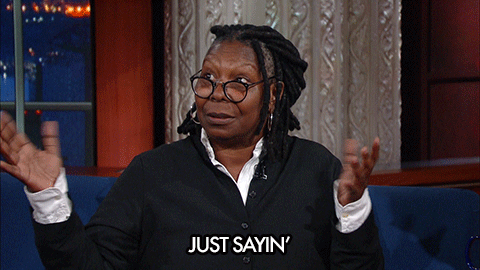The Harry Potter Series Makes a Mess of Its Commentary on Racism


ScreenPrism is doing a series about the symbolism of the four Hogwarts Houses, and being a proud Slytherin (Ravenclaw rising), I was looking forward to their analysis and, as expected, Slytherin being the “racist house” came up. Talking about racism in Harry Potter is always … complicated, because it’s a series that was built upon the good intentions of wanting to say something important about race, racism, classism, etc., but failing in how that was implemented—especially when it comes to really addressing what we’re saying when we call Death Eaters and pureblood-minded wizards “racist.”
So here are some things I feel need to be established when talking about race and ethnicity in Harry Potter: One, the books are not as inclusive as they should be for a book series that takes place in a U.K. magic school. Two, J.K. Rowling’s attempts to retroactively make the books more inclusive after the fact don’t help. Three, we should not read blood purity in the Harry Potter context as inherently the same as racism in our modern world, because they are not the same. Four, if you want to build a narrative about fighting prejudice, maybe don’t make all the major players in the story white.
Lack of inclusion
In the original Harry Potter books, the named and noted characters of color are: Cho Chang, Dean Thomas, Blaise Zabini, Lee Jordan, Angelica Johnson, Kingsley Shacklebolt, and the twins Parvati and Padma Patil. The only (implied) Jewish character is Anthony Goldstein.
None of these characters are part of what J.K. Rowling calls the “big seven,” the characters whose journeys are key to the series, who are: Harry Potter, Hermione Granger, Ron Weasley, Ginny Weasley, Neville Longbottom, Luna Lovegood, and Draco Malfoy.
None of the characters of color in the series really have any semblance of cultural markers other than their names, and sometimes their hair being mentioned to either be in braids or dreadlocks. I mean, Cho Chang could be either someone of Korean or Chinese ancestry, or even both. While the United Kingdom is not as diverse as the United States, it still has a substantial Asian and Black British population, so for there to only be eight book-canon non-white named characters, out of a cast of hundreds, is truly unimpressive.
As a result, the”half-blood” and Muggle-born characters who get most of the “wizard racist” comments end up being white characters, like Hermione, and are attacked by, mostly, other white characters, like Draco Malfoy. It also creates huge backlash when characters like Blaise Zabini appear, both pureblood and Slytherin, because these binaries about the wizarding world based are based on issues in our world that have never actually been dealt with in the text, because the story doesn’t focus on actual marginalized characters.
Black Hermione
When Cursed Child was announced and Noma Dumezweni, a black actress, was cast as Hermione, J.K. Rowling came out and said that Hermione could be anyone of any race.
Well, no, she couldn’t.
I don’t mean this in the fan-art, fan theory sense, where you could say that Hermione is not described explicitly as white because of such-and-such in the books. I’m talking about in canon, Hermione is not written to be a person of color, because if she were, then suddenly, we’d have to have a real discussion about actual racism and not just made up allegories regarding goblins and elves.
If Hermione were a non-white child from a non-magical family thrust into a world in which she has to deal with a whole new world of prejudice, that would show up in the way that character was constructed. Being called a “Mudblood” wouldn’t be an insult she would just brush off, because it would be yet another racial slur that would impact her life, having grown up in a minority in one white space and then be transferred into another that has a whole new set of discriminatory ideology.
Also, there is absolutely no way a woman of color would have come up with S.P.E.W., especially not in the way that book Hermione does it. Racism in the real world would suddenly need to be addressed, if only to make a clear juxtaposition between the muggle and wizard communities.
The same goes for J.K. Rowling saying that of course there are Jewish wizards in Hogwarts, while having none of them dealing with wizard Hitler or referencing any Jewish holidays, even though we celebrate Christmas every year in these books.
You can’t say that your series includes oppressed and marginalized people, but then erase all of that history and context in a series that is explicitly taking from Ku Klux Klan, Nazi, and white supremacist language when crafting the antagonist. It’s not only lazy, but it ignores that Harry Potter takes place parallel to our world, which means …
Racism still exists
One of the things people used to ask me was how could I be a Slytherin or like Slytherin even though they’re bigots and racists. Shouldn’t I find that offensive? To which I say … there are black Slytherin and black purebloods in the Harry Potter universe.
Whenever we get into the “this is a metaphor for slavery/racism” territory, it’s always important to point out that when marginalized people actually exist in the story, we shouldn’t need metaphors for it. Slavery exists in the Harry Potter world. Racism against non-white people exists in the Harry Potter world, maybe not among wizards, but it does around muggles, and if you are going to discuss fanaticism and intolerance, maybe start there?
Not to mention the whole “pureblood equals white” narrative assumes that the entire Wizarding World revolves around white European wizards.
When my friend made me watch Fantastic Beasts with her, one of the things that sprung out to me was that the American wizarding world is hella segregated when it comes to wizards and No-Maj’s (Muggles), and there is a black female president of the Magical Congress in Seraphina Picquery. But the movie takes place in 1926, which means Jim Crow is still a thing, and according to the wiki for Picquery, her character is from Savannah, Georgia.
Is there a black wizard version of the NAACP? Do non-white wizards just allow their “No-Maj” counterparts to be oppressed? The Goldstein sisters are coded as Jewish. Do they do anything during WWII? There is a female president, but women in America literally just gained the right to vote six years prior. Were witches involved in suffrage?
As soon as you expand the Harry Potter universe, these questions get asked, and it turns into a mess, because if magical people can be born from non-magical Muggles, then that means that a random oppressed person could have just been born with magic. Even if they didn’t become a trained witch or wizard, we know from the story of Ariana Dumbledore that magical kids can’t control their magic, and it can result in violence against them. Or as Fantastic Beasts explains, they could become an Obscurial.
But okay, let’s say that goblins and house elves are supposed to be our POC/oppression avatars. Then why don’t we ever see more of them in an active role? Most of the characters who are part magical creature are joked about, like Hagrid, and our house elf representation is made up of Dobby, Winky, and Kreacher. Dobby, who causes problems for Harry, gets freed and then basically helps Harry in the most incompetent way possible then dies saving his human friends. Winky, who is scapegoated by her owner and becomes a drunk because she can’t handle freedom. Then there is Kreacher, who … gets revenge on his abusive master by setting him up to die. You know what? We claim Kreacher.
Not to mention that Muggle-born and half-blood wizards also participate in the oppression of magical creatures … sooooo?

(HBO)
Racism metaphors are meaningless without context
During the 2016 election, I remember reading a bunch of articles about a “study” that claimed that Harry Potter readers were less likely to vote for Donald Trump. I also remember the loud cackle I gave reading that.
Clearly, the study missed out on all the people who claimed that there was no way Blaise Zabini could be black because he was supposed to be “attractive,” or the people who came for Angelina Johnson for marrying George after Fred died, or like the racists who have fits every time people make POC Harry Potter fan art. It just gave people waaayyyy too much credit.
Yes, Lord Voldemort is clearly modeled after Hitler, but he is also a character whose sociopathic behavior is due to the fact he was conceived while his father was under the influence of a love potion, and therefore, he cannot love. And that’s not a fan theory, J.K. Rowling said that. (EDIT: For clarity, yes Rowling does see this more metaphorically than literally, but for me it says a lot about how Rowling created the character and this idea that all racists/bigots need is love).
Just because Draco Malfoy and the Malfoy families are unfriendly blonde hotties doesn’t mean they can just be shorthand for Aryans because they are ancient pureblood family—not when the Lestranges are also an ancient pureblood family and Leta Lestrange will be played by Black-Jewish actress Zoe Kravitz in Fantastic Beasts: The Crimes of Grindelwald.
I appreciate what Rowling was trying to do with the story and with Voldemort and the Death Eaters. However, when you’re trying to create a story about racial inclusion and you can’t be bothered to make any of the “big 7” POC or ethnic minorities, then your message is only half-baked.
Also, let’s talk about the context in which blood purity exists, since when we talk about race and racism in the real world, we talk about the historical context in which those ideas develop. So how does that apply in the Wizarding world? According to information from the text and secondary sources in the ancient times, wizards were hunted by Muggles, which forced wizards to go “underground” and separate themselves from the Muggle world. They were tired of living in fear of Muggles because, despite their magic, they were still a minority group, and being forced to suppress their magic in order to “pass” led to physical and emotional trauma that could potentially turn them into Obsurials.
So when Salazar Slytherin was against letting Muggle-born students into Hogwarts, the context of it goes as such: Muggles oppressed us. We were forced to separate ourselves from them to survive. We created this school in order to ensure that our culture and way of life sustains itself, and now you want to let these children with Muggle parents into this school, which could potentially expose us to the very people who used to emotionally and physically traumatize us.
… that is not racism.

What came out of it, the stuff that Voldemort spews, is self-hatred and turns into prejudice, but the stuff it is rooted in is self-preservation of a minority in a world that actively oppressed them.
What I find so funny about even writing this is that it proves, furthermore, why these world-building scenarios don’t work when trying to talk about racism, because racism doesn’t exist in a vacuum. It exists within culture, history, and social issues, and you can’t just take our world, put pretend bigotry on top of it, and actually think it holds up to even the most basic breakdown of how racism actually works.
When I think of ways in which half-blood and Muggle-born wizards are discriminated against, beyond the views of extremists, the story doesn’t show much of that. It’s like, beyond Death Eaters, everyone else is cool, which is, again, not how discrimination works—especially if this is framed as centuries-old discrimination.
And for those of us who are non-white members of the Slytherin House, it is important to remember that ambition, a drive to be the best, cunning, and let’s be real, snobbery are not traits that only belong to white people. Bad and Boujee is the Slytherin mantra.
When muggles try and talk to Slytherins #BlackHogwarts pic.twitter.com/j8JE3OEV4D
— Shayde Sinclair (@shayde_sinclair) January 12, 2018
(image: Warner Bros/Screenshot/Edited together by author)
Want more stories like this? Become a subscriber and support the site!
—The Mary Sue has a strict comment policy that forbids, but is not limited to, personal insults toward anyone, hate speech, and trolling.—
Have a tip we should know? [email protected]
